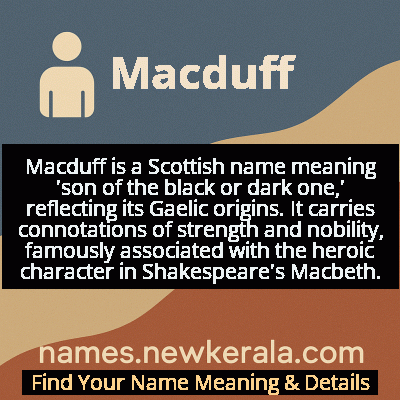Macduff Name Meaning & Details
Origin, Popularity, Numerology Analysis & Name Meaning of Macduff
Discover the origin, meaning, and cultural significance of the name MACDUFF. Delve into its historical roots and explore the lasting impact it has had on communities and traditions.
Name
Macduff
Gender
Male
Origin
Scottish
Lucky Number
9
Meaning of the Name - Macduff
Macduff is a Scottish name meaning 'son of the black or dark one,' reflecting its Gaelic origins. It carries connotations of strength and nobility, famously associated with the heroic character in Shakespeare's Macbeth.
Macduff - Complete Numerology Analysis
Your Numerology Number
Based on Pythagorean Numerology System
Ruling Planet
Mars
Positive Nature
Generous, passionate, energetic, and humanitarian.
Negative Traits
Impulsive, impatient, moody, and can be overly emotional.
Lucky Colours
Red, maroon, scarlet.
Lucky Days
Tuesday.
Lucky Stones
Red coral, garnet.
Harmony Numbers
1, 2, 3, 6.
Best Suited Professions
Military, sports, philanthropy, leadership roles.
What People Like About You
Courage, energy, leadership, generosity.
Famous People Named Macduff
Macduff of Fife
Scottish Thane
Legendary ancestor of Clan MacDuff who helped Malcolm III defeat Macbeth
William Macduff
Religious Leader
Influential Scottish minister and author of religious works in the 1800s
Ian Macduff
Legal Scholar
Renowned expert in mediation and conflict resolution, professor at leading universities
Name Variations & International Equivalents
Click on blue names to explore their detailed meanings. Gray names with will be available soon.
Cultural & Historical Significance
Historically, Clan MacDuff was one of the most powerful Scottish clans, with their chief traditionally serving as the Earl of Fife. The name represents a bridge between Scotland's Celtic past and its later medieval kingdom, maintaining cultural relevance through centuries of Scottish history. In modern times, the name continues to evoke images of Scottish nobility, resilience, and the enduring struggle for justice, making it a powerful cultural symbol that transcends its original geographical and historical contexts.
Extended Personality Analysis
Individuals named Macduff are often perceived as possessing strong moral convictions and unwavering determination. They tend to be principled leaders who stand firmly for what they believe is right, even when facing significant opposition. This stems from the literary and historical associations with justice-seeking and loyalty to rightful causes. Macduffs are typically seen as reliable and steadfast, with a deep sense of responsibility toward their community and family. They often exhibit a quiet strength rather than overt aggression, preferring to act decisively when principles are at stake.
The historical weight of the name suggests someone who carries themselves with dignity and purpose, potentially making them natural leaders in challenging situations. Their personality is often characterized by a blend of traditional values and modern adaptability, allowing them to navigate complex social landscapes while maintaining their core identity. While they may appear reserved initially, Macduffs typically reveal deep emotional depth and loyalty to those they trust. The name's association with overcoming adversity suggests resilience and the ability to transform personal tragedy into purposeful action.
Modern Usage & Popularity
In contemporary times, Macduff remains primarily a surname but has seen occasional use as a distinctive first name, particularly in Scotland and among Scottish diaspora communities. Its usage as a given name often reflects pride in Scottish heritage or appreciation for literary history. While not among the most popular names, it maintains a steady presence, especially in regions with strong Scottish cultural ties. The name has experienced minor revivals following productions of Macbeth or Scottish cultural events. Modern parents choosing Macduff typically seek a name with historical depth and cultural significance rather than following naming trends. It's more commonly used in Scotland, Canada, the United States, Australia, and New Zealand among families with Scottish ancestry, serving as both a connection to heritage and a statement of cultural identity.
Symbolic & Spiritual Meanings
Symbolically, Macduff represents the triumph of justice over tyranny and the importance of moral courage. The name carries connotations of rightful vengeance and the restoration of order, drawing heavily from its Shakespearean portrayal where Macduff serves as the instrument of divine justice against Macbeth's regicide and tyranny. It symbolizes the idea that true strength comes from principle rather than mere physical power. The 'son of the black/dark one' etymology also suggests someone who can navigate difficult or shadowy circumstances while maintaining integrity. In broader symbolic terms, Macduff embodies the archetype of the righteous avenger and loyal subject, representing the importance of honor, duty, and the courage to confront evil regardless of personal risk, making it a powerful symbolic name for those who value justice and moral fortitude.

